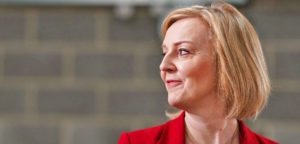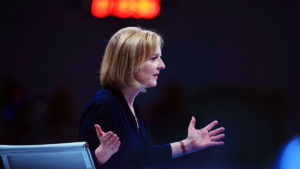Tony Blair used to say that the worst thing about being in opposition was that you would wake up every morning thinking about what you wanted to say, while government ministers were waking up thinking about what they were going to do. And in politics, action always trumps words. It changes the facts on the ground. It fills airwaves, newspapers, and social media. It shows voters that you mean what you say.
This summer has been different: politics has been on pause while Boris Johnson has partied and holidayed and the Conservative Party has been deciding who will replace him. The Labour Party is now polling so strongly that some predict they would even scrape a narrow majority if a General Election were held today — an impressive turnaround from the Tory landslide of 2019.
Truss faces an unenviable in-tray. The climate crisis is real and proximate — whether locally, where just weeks ago the London Fire Brigade had to fight more fires on one day than at any time since the Blitz, or globally, with a third of Pakistan’s land mass flooded. Meanwhile, the NHS is having a summer as bad as any winter. The Russian war in Ukraine continues and could still go nuclear.
Faced with the likelihood of a new Prime Minister fighting and failing on multiple fronts, the Labour Party could just sit back and enjoy the chaos. After all, as the saying goes: “Oppositions don’t win elections; governments lose them.” But this would be a huge error.
In unprecedented times, precedent is a poor guide to success. In August, Keir Starmer showed just how significant an opposition intervention can be by offering a simple solution to rising energy prices: don’t let them rise in the first place, and fund support for households with a windfall tax on energy companies’ bumper profits. His proposal was so popular that three in four Tory voters supported it, leaving Truss caught in a trap: ignore Labour’s policy and leave millions to suffer in poverty, or adopt it and show that Labour is driving the government agenda.
This shows what should be at the heart of Labour’s strategy going into the autumn and beyond: look, sound and act like an alternative government. In this respect, Labour could do worse than study what Tony Abbott and the Liberal Party pulled off in Australia in 2013. For most of 2012, Abbott had relied on aggressive parliamentary tactics to disrupt the business of the minority Australian Labor Party (ALP) government. But in January 2013, after the long post-Christmas summer break, Abbott and his team styled themselves as the adults in the room, offering a short, crisp list of policy proposals. They looked and sounded the part, and provided a stark contrast to a divided Labor administration.
It worked then for Tony Abbott — who won a landslide victory that year — and it would work well here for Starmer. That’s why senior officials in UK Labour are now looking at the most recent Australian election and concluding that a “small target” strategy is the best way to win power, and that policy proposals are hostages to fortune. The problem is that Australian Labor beat an unpopular incumbent. In the UK, the unpopular incumbent has been removed by his own party and, if Truss uses the powers of government effectively, she is perfectly capable of being the change the country wants.
Starmer, therefore, has to propose change, using Labour’s conference at the end of the month to showcase just a few of its most popular and core policies. This would kill two birds with one stone. It would signal what Labour would do differently, while also answering the voters who tell pollsters they haven’t heard about the party’s plans. In reality, Labour has announced some 200 policies since 2019. But to cut through, these announcements need to be few and pointed: cap energy prices; insulate more homes; cut NHS waiting times; buy British; fix Brexit. These could be expanded in a pledge card, but they need to be focus-grouped to death and then stuck to. As the saying goes: “By the time you’re sick of saying it, the public are just starting to hear it.”
Critical to delivering the message is having the right team – one that can command attention and persuade. So if Shadow Cabinet members aren’t up to the task of campaigning, they should be replaced now with those who are. Starmer needs to be fielding the team who will be ministers after the next General Election — and voters need to see them early and often.
Optimism and positivity must be central to Labour’s campaign. Yet for most of the last decade, the party has been afflicted by miserabilism, as if it needs to bludgeon voters into a depression before they can bring themselves to vote Labour. Of course, it will always be tempting to lean into the vision of “Broken Britain” that is increasingly cropping up in conversations around the country. The problem is that miserabilism is paralysing — it leads to acceptance not activism. Labour’s frame must be upbeat: “There’s nothing wrong with our great country that couldn’t be sorted with a change of government.”
None of this is to say that there is no role for negative campaigning. Voters will always tell you they hate it, but then their behaviour shows that it still affects their vote. Politics is a contact sport, so Labour needs to “punch the bruise”. Is the government hurting on an issue? Starmer’s team needs to focus on it. The cost-of-living crisis will be central, but if it were not for inflation, then the NHS would be on every front page. In normal times, the collapse of the ambulance service would lead to ministerial resignations. Labour’s health team should make that their aim. And if it weren’t for the cost-of-living and NHS crises, then the current crime wave and the failures of the police to keep the streets safe would dominate politics. A nimble and opportunist opposition should be able to make hay.
So Labour should be thankful for the wealth of material provided by Truss and Sunak during the leadership election. Starmer should exploit this by appointing a Shadow Minister for Government Splits whose job would be to use and re-use the best material from the campaign and relentlessly publicise it on social media — and then add to it when the inevitable divisions emerge after Truss’s first reshuffle and ministerial appointments.
With four leaders in six years, the Conservatives have shown that regicide is addictive. For once, the fate of the self-destructive Napoleon should be ignored and Labour should interfere while its enemy is making mistakes. Politics is shaped by struggle and Starmer and his team need to lead the fight — or their next campaign will share the same fate as Sunak’s.
Disclaimer
Some of the posts we share are controversial and we do not necessarily agree with them in the whole extend. Sometimes we agree with the content or part of it but we do not agree with the narration or language. Nevertheless we find them somehow interesting, valuable and/or informative or we share them, because we strongly believe in freedom of speech, free press and journalism. We strongly encourage you to have a critical approach to all the content, do your own research and analysis to build your own opinion.
We would be glad to have your feedback.
Source: UnHerd Read the original article here: https://unherd.com/



